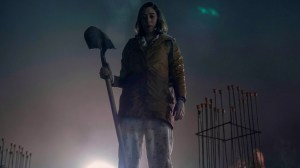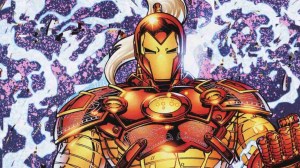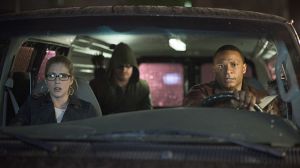The more that comic book movies become hits with audiences and critics alike, the more iconic characters make the jump to the big screen. One of the latest figures to get the cinematic treatment is Red Sonja, whose history goes back decades. Initially a character created by Robert E. Howard in the 1930s, Marvel Comics put their own spin on the character in the 1970s, serving somewhat as a counterpart to Conan the Barbarian. While the character was previously adapted for the big screen in 1985, filmmaker MJ Bassett has put a fresh spin on Sonja for the new Red Sonja, which stars Matilda Lutz as the titular hero. Red Sonja lands on Digital on August 29th.
Videos by ComicBook.com
The new Red Sonja is described, “Captured. Chained. Forced to fight for survival. Red Sonja must battle her way through the blood-soaked pits of a tyrant’s empire and rally an army of outcasts to reclaim her freedom and take down Dragan and his ruthless bride, Dark Annisia.”
ComicBook caught up with Bassett and Lutz to talk their history with Sonja, bringing in new perspectives, and more.

ComicBook: MJ, what was your connection to the character of Red Sonja before getting involved in this project? I know Matilda had said she wasn’t as familiar with the character, but what was your familiarity?
MJ Bassett: I was super-duper familiar. I’m a Robert E. Howard fan. I’m a fantasy fan, long-life fantasy fan. I made a movie called Solomon Kane about 10-15 years ago, which is a Robert E. Howard character. I obviously read all his works because of Conan, and I knew about Red Sonja from the short story “Shadow of the Vulture,” even though that’s not the Red Sonja we end up making a story about. Then I grew up with Roy Thomas in the Marvel run of Sonja, where she was this buxom, very male gaze-y character in this chainmail bikini.
I saw the 1985 movie with Brigitte [Nielsen] and Arnold [Schwarzenegger], which I didn’t love. It wasn’t my version of Sonja. I’ve become friends with Arnold and I know Brigitte, and it’s good on them, but that’s not what I wanted. From that time, it was always part of my ambition when I became a filmmaker. I knew I wanted to make fantasy, and there were certain characters I really wanted to try to work with.
Sonja had been in development for like 17 years with multiple directors. I know Robert Rodriguez was going to do it with Rose McGowan, and Bryan Singer was attached. Thank God he didn’t do it. Simon West, and then Joey Soloway was going to do it for a while, and there were scripts and iterations. I’ve met with the studio multiple times, since Solomon Kane, in a way, when people said, “Do you want to do Conan next?” I said, “No, I want to do Sonja.”
But I hadn’t come out as trans at that point, so nobody understood why the hell I wanted to do a female character. Now everybody knows. But it was that notion of, I know what I can do with this person. I think I understand what I want them to be. So when all those other iterations fell apart, I was in the studio with the company. I went, “Just give it to me. I am the most qualified person who can do this. I understand her. I’ve been through these transformations, and I just think I know I can do something. It may not be the comic book version. It may not be what everybody [wants], it’s what I want.”
And then you find your perfect Sonja, which is why I’m here with Matilda, and you go, “Okay, that’s it. We have the perfect package.”
It’s funny, reading about the production of this and remembering Robert Rodriguez had been attached, but it was a complete jump scare when I read that Bryan Singer was attached to it at one point. That was horrifying to remember.
Bassett: He had a much bigger budget than we did, though. I think he had like $150 million for his budget. We had 10% of that.
Matilda, Red Sonja in this script, what was it about this version of the character that resonated so strongly with you? And what was the biggest challenge with this version of Red Sonja?
Matilda Lutz: I resonated with the script right away. As soon as I read it, I felt like the character was obviously a warrior. I knew it was going to be super fun with the action and the physicality of it and sword fighting, horseback riding, archery, climbing, all of it. But what stood out to me was the fact that she’s a survivor. She’s a warrior, but she’s also a survivor, so she has to find a way to find her place in the world.
It’s about identity and how she, by finding her people and finding the world that she wants to live in, she’s also so caring about the animals and the forest she lives in. I think those are all messages that I really want to see in movies more and more. So that’s the two things that really resonated with me.
The biggest challenge … The physicality of it was a big challenge because I had never done sword fighting. I had been on a horse, but just like walking, like walks in fields with the horse, not shooting arrows while galloping. The challenge was the physical part of it, it was a huge challenge, but I grew up with sports with three brothers, battling my way through life, so I feel it was like a lot of fun to do that part.
MJ, what was it about Matilda that confirmed she was your Sonja? Was it through her previous work? Was it something that she brought to the audition process, a specific moment that you knew, “Okay, this is my Sonja,”?
Bassett: She’s really cheap. I mean, that’s the main reason.
All right. Next question.
Bassett: No, it was, when I finally got it, I got hold of this character, I knew what I wanted to do with it. One of the issues was, who’s going to play Sonja? That’s it. If you get Sonja wrong, the movie goes wrong in every conceivable way, and I was aware of this movie Revenge because people had talked about it. I knew about Matilda, but hadn’t … she wasn’t completely front and center. [She] was one of them on the list.
This woman has lots of capabilities. I can see that there can be power, there can be pain, there can be humor and humility — all the things you’re looking for. Then you go down the route of, “Well, do I cast a warrior woman or somebody who’s physically capable?” But the truth is, all those things can be learned.
The physical aspects can be learned, as Matilda absolutely proved … what can’t be learned is the compassion and the humanity that has to exist at the heart of the character. I watched Revenge and everybody was on board. Matilda’s amazing. Watch Revenge. Study what’s going on there. Then meet her and you go, “Oh, no, this is a human being.” Because I also didn’t want to make a movie that was a gender political movie. I wanted … the fact that Sonja is a woman is not consequential to me. She’s a person, first and foremost. That meant I needed somebody who can embody that humanity, because I knew where I wanted the film to go at the final moments. What it needed to be about for me … we go through the sword fighting and we’ve got cyclopses and monsters and we’re in a burning forest and it’s all amazing, but at the end of the day, it’s about, how can you be human in this world? Of all the qualities Matilda has as a human being and as an actor, that humanity never gets lost. Even when she’s chopping off heads, it’s very human.
Matilda, you got to bring Sonja to life, there were things about the character that resonated with you. Now that the character is at least temporarily behind you, what did you personally take away from playing Sonja and this experience of bringing her to life for this adventure?
Lutz: What touched me about her and playing her, obviously, the whole physical aspect of it gives you a power that you don’t even realize you’re getting. And then the fact that she’s unapologetic, she doesn’t ask permission to take up space, that she’s powerful, speaks her mind, doesn’t care about what other people think about her ideas and she just says whatever she thinks. I really, really love that about her. I’m not, in my life, like that. I ask myself a lot of questions about if I should say a certain thing or not, and I loved that about Sonja, and that’s something that really stayed with me.
MJ, you brought this up, the fact that so many people, when they think of Red Sonja, they think of, let’s say her “impractical” outfit that she’s known for. Were there other versions where it was, “Let’s just abandon that altogether because it doesn’t translate to a movie,”? Were there other versions where it was less of a tongue-in-cheek incorporation of it? What was that process of honoring the origins but also honoring the absurdity of it?
Bassett: Well, I think it’s one of those things where you understand when you take it on, it’s like saying, “Should Batman wear the cape?” Yes, of course. How do you get around it?
So with this chainmail bikini, I think, and to be fair, it was the script that I inherited, there was definitely a good way in that script, and it was simply a question of making it not her choice. That was what it needed to be. It needed to be something imposed upon her that then she embraced and said, “If you’re going to do this to me, I’m going to own it.”
It’s, for Sonja, every decision, everything that happens to her and every decision she makes, she ultimately owns, and I found that was incredibly important. So when Tony Way, the actor who plays the armorer who gives her this chainmail bikini, it’s a moment of comedy — [which is] brilliant, because it has to be, it’s absurd. Nobody chooses this armor. Literally, Sonja says, “What does it protect?” And he says, “Nothing, but the crowd will love it.” So it’s that moment when we’re almost breaking the fourth wall, which is terribly dangerous because I don’t do campy stuff. I let the world exist, but I also felt it was completely right for her to be able to say, “All right, you want me to have this? I will show you what I can do in this. Imagine what I can do when I’m fully empowered.”
Then finding the right kind of chainmail bikini with the right look that worked with Matilda’s physicality and all the things she had to do in it as well. It’s not cosplay. We’re not walking down Comic-Con. We’re rolling around in dirt and sh-t and riding horses, so it has to be practical and capable. That’s one of the things I’m so grateful to Matilda for, because she never said, “I’m not doing that. It’s too cold. It’s too wet. The fire’s too close.” It was just, “What do you got? Bring it on.” And that’s Matilda and that’s Sonja, and I love it.
Red Sonja hits Digital on August 29th.
This interview has been edited for length and clarity. You can contact Patrick Cavanaugh directly on Twitter or Instagram.








